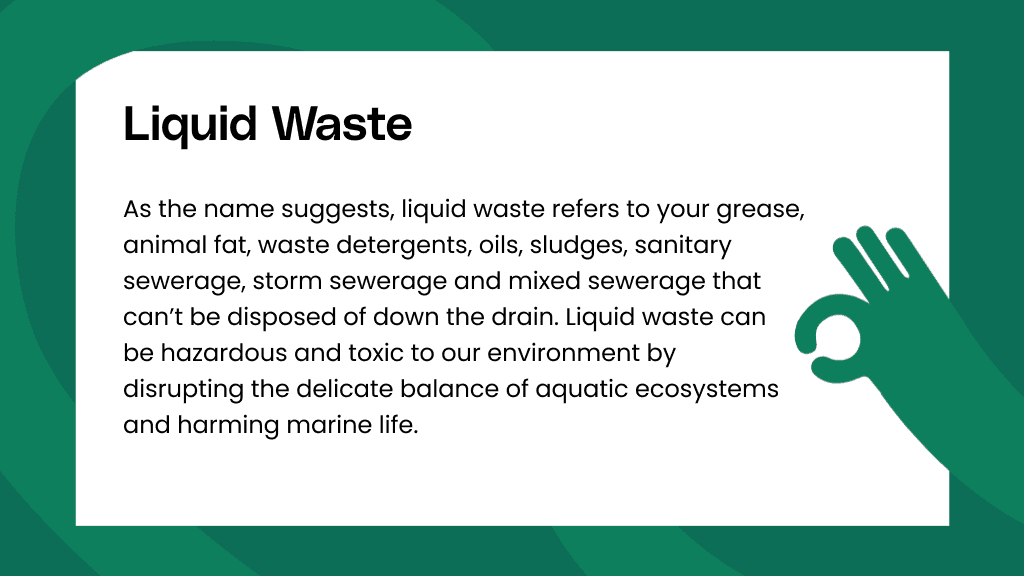Indicators on Reclaim Waste You Need To Know
Table of ContentsSome Known Incorrect Statements About Reclaim Waste An Unbiased View of Reclaim WasteSome Known Details About Reclaim Waste Reclaim Waste Things To Know Before You BuyLittle Known Facts About Reclaim Waste.
Check out the types, occurrences, and forms of fluid waste. Domestic sewer waste describes the waste and items from a property septic system. This sort of waste is created by people in homes, institutions, and various other structures. This only consists of sewage-disposal tanks that have a drainpipe field. The appropriate management and disposal of residential sewer waste call for liquid waste to be moved to a sewer treatment plant where the proper techniques and devices are related to purify and take care of waste.
Commercial waste frequently includes possible threats, such as flammable products or a combination of liquid and strong waste items, and calls for an extra innovative and thorough disposal procedure. The disposal of commercial waste generally involves the filtering of waste before transportation to guarantee safe and proper disposal. Hazardous waste is created from byproducts and drainage of industrial procedures and production.
This kind of waste can not make use of the very same sewage monitoring transport or procedures as septic or commercial fluids. The industrial waste management procedure requires the examination and testing of fluid waste prior to it undergoes the disposal process (liquid waste disposal). Runoff waste is the liquid waste that originates from drainage and excess stormwater in highly populated locations or cities
Runoff waste can trigger contamination and flooding if not dealt with correctly. Find out more about drain cleaning and waste monitoring. Guaranteeing correct waste monitoring can protect against calamities and minimize ecological harm. Both individuals in residential settings and professionals in business or production industries can gain from recognizing the processes and regulations of liquid waste management.
The Buzz on Reclaim Waste
Get in touch with PROS Providers today to discover concerning our waste management and disposal services and the correct methods to care for the liquid waste you generate.
(https://reclaimwaste1.blog.ss-blog.jp/2024-11-12?1731425991)This so-called 'wastewater' is not just an essential source yet, after treatment, will be launched to our land, waterways or the sea. Used water from bathrooms, showers, bathrooms, kitchen sinks, washings and commercial procedures is recognized as wastewater.

water made use of to cool down machinery or clean plant and tools). Stormwater, a form of wastewater, is runoff that moves from agricultural and city areas such as roofings, parks, yards, roadways, courses and seamless gutters right into stormwater drains pipes, after rain. Stormwater moves unattended straight to local creeks or rivers, eventually reaching the sea.
The Greatest Guide To Reclaim Waste
In Queensland, most wastewater is dealt with at sewage therapy plants. Wastewater is transferred from residential or commercial websites with a system of sewage systems and pump stations, called sewerage reticulation, to Recommended Reading a sewer therapy plant. Regional governments develop, maintain and operate most sewage therapy plants. Operators are licensed under the Environmental Security Act 1994 to discharge cured wastewater at an acceptable environmental criterion into waterways.
The Department of Natural Resources encourages city governments concerning managing, operating and keeping sewerage systems and treatment plants. In unsewered locations, city governments might require owners to mount individual or family sewer treatment systems to deal with domestic wastewater from commodes, kitchens, shower rooms and washings. The Department of Natural Resources authorises using house systems when they are verified to be effective.
Many stormwater gets no treatment. In some new communities, therapy of some stormwater to get rid of litter, sand and crushed rock has actually begun using gross toxin traps. Wastewater therapy happens in 4 stages: Gets rid of solid matter. Larger solids, such as plastics and other items incorrectly discharged to drains, are removed when wastewater is passed via screens.
Wastewater then streams right into large tanks where solids settle and are removed as sludge. Oil and residue are skimmed from the surface. Makes use of little living organisms knows as micro-organisms to damage down and eliminate staying liquified wastes and great fragments. Micro-organisms and wastes are integrated in the sludge. Removes nitrogen and phosphorus nutrients that might cause algal blossoms in our rivers and threaten marine life.
The Definitive Guide to Reclaim Waste
Nutrient elimination is not readily available at all sewage treatment plants because it calls for expensive specialized equipment. Clear fluid effluent created after therapy might still include disease-causing micro-organisms - liquid waste disposal.

This usually suggests wastewater has actually to be treated or pollutants removed prior to it can be discharged to waterways. A lot of wastewater flows right into the sewerage system. Under the Act, city governments administer approvals and permits for environmentally pertinent activities (Ages) involving wastewater releases that might have a local influence. The department provides approvals and permits to Ages involving wastewater launches that may have a local or statewide influence.
About Reclaim Waste
Tracking supplies factual information concerning water high quality and can verify that permit conditions are being met. The info gotten through tracking gives the basis for making water high quality choices.